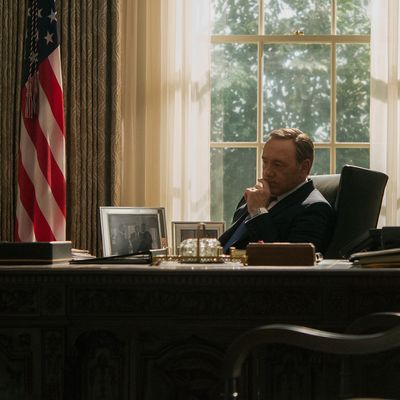
How much do you really want to know about the third season of House of Cards?
Not too much, IÔÇÖm guessing.┬áBeau WillimonÔÇÖs remake of the British potboiler has plenty of issues, many of which IÔÇÖve detailed in previous reviews. But thereÔÇÖs no denying that itÔÇÖs engrossing and addictive,┬áthat its virtues are bound up in its audacity, and that its audacity comes from knowing its characters and giving its formidable actors an unending series of juicy scenes, laid out like courses at a banquet.
So IÔÇÖll write a detailed review next week, leave out one enormous and kind of silly reversal of expectations, and say for now that the first few episodes sent out for review are the most satisfying to date. Season three moves away from the colorful but ultimately tedious power-tripping of seasons one and two ÔÇö Frank Underwood is underestimated; Frank Underwood wins; yay, Frank! ÔÇö and becomes more of a political procedural. ItÔÇÖs less concerned with what will happen next than with how it will happen, and what each victory or defeat will reveal about the characters. Up till now, the show has been mainly content to get off on its smirking, fourth-wall-breaking antiheroÔÇÖs diabolical awesomeness, watching slack-jawed as he bests a series of arrogant but unworthy opponents (including the supposedly formidable enemy, billionaire Raymond Tusk). This time, Frank (Kevin Spacey) and his wife Claire (Robin Wright) are backed into a series of increasingly tight corners; now youÔÇÖre watching them desperately try to hold onto power rather than acquire it. That one simple but important adjustment makes them a nearly sympathetic pair ÔÇö a pair of vipers surrounded by mongooses ÔÇö and turns House of Cards into what I personally always hoped it would be: a deranged horror-film cousin of The West Wing, starring a cross between Jed Bartlet and Macbeth.
When we last left our nearly conscienceless duo, theyÔÇÖd risen to the most powerful office on the planet. Frank became vice-president at the end of season one and inherited the presidency after season two, following a series of maneuvers so preposterous that youÔÇÖre better off not scrutinizing them too closely. (Two of FrankÔÇÖs masterstrokes, getting rid of Peter Russo in season one and Zoe Barnes in season two, likely wouldÔÇÖve been all over YouTube almost instantly, the realities of video surveillance being what they are.) Season three picks up six months after FrankÔÇÖs swearing-in.
As ludicrously compressed as that time frame is, it goes a long way toward taking the piss out of our villainous narrator. HeÔÇÖs gotten what he always dreamed of and canÔÇÖt rise any higher; now itÔÇÖs all about holding on. HeÔÇÖs thinking about his legacy, and about how the impending reelection (or, in his case, election) might prevent him from achieving it. He wants to pass a revolutionary jobs bill that requires both houses of Congress and the American public to agree that itÔÇÖs necessary to gut Social Security and other sacrosanct social programs. (Frank is a Democrat, but he pronounces the word entitlements┬áRepublican-style, as if itÔÇÖs been marinating in poison.) Claire is also thinking about her future, and unlike Frank, she hasnÔÇÖt risen as far as she can go; like Hillary Clinton, sheÔÇÖs been the power behind the throne for decades and thinks sheÔÇÖs equipped ÔÇö indeed, entitled ÔÇö to sit on the throne herself, so she angles for a plum cabinet job and seems somewhat taken aback when the UnderwoodsÔÇÖ foes (which include resentful Democratic legislators) try to trip her up and make her seem merely arrogant.
The unglamorous reality of governance centers House of Cards without sapping its deliciousness. Spacey is as much of a ham here as he always was, but his sneering and seething is poignant: Frank, outnumbered and overscheduled, canÔÇÖt seem to get any traction. The character seems nearly Nixonian here ÔÇö an impression furthered by the ruthless clarity of the showÔÇÖs direction, which situates the characters in a White House so cavernous and dimly lit that it might as well be a Game of Thrones set. (In the second episode, thereÔÇÖs an ostentatiously iconic but lovely shot of Frank silhouetted against French doors in the Oval Office that evokes Oliver StoneÔÇÖs melancholic Nixon.) Frank is so afraid of losing everything he fought so hard to win that he seems on the verge of actually becoming a loser; at times he seems to sincerely doubt himself. The deliberately fragmented storytelling makes it seem as though itÔÇÖs hard for Frank to complete a plan, or even a thought ÔÇö an unexpected but welcome note of realism in the showÔÇÖs dark fantasy world. HeÔÇÖll start a meeting with his chief of staff Remy Danton (Mahershala Ali) or House majority whip Jackie Sharp (Molly Parker), then ask them to hold that thought, and head into the next room to get the latest poll numbers or strategize on the phone with Claire. It would appear that what generals always say about war is true: Conquest is the easy part; itÔÇÖs the occupation that always gets you.
The show doesnÔÇÖt stint on dirty fun, though. More low-key than previous seasons, itÔÇÖs still very soapy ÔÇö so much so that you might wonder if the presence of ABCÔÇÖs similar but much livelier Scandal and ShowtimeÔÇÖs turgid half-military thriller, half-political drama Homeland pressured Willimon and Company to up their game. Just in case youÔÇÖre worried that House of Cards has suddenly turned respectable and realistic in season three, the opening scene will reassure you: Frank visits his fatherÔÇÖs grave and asks his retinue of guards and lackeys to give him a moment alone. He pisses on the tombstone.


